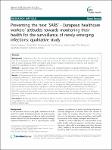Preventing the next 'SARS' - European healthcare workers' attitudes towards monitoring their health for the surveillance of newly emerging infections: qualitative study
Aghaizu, Adamma
Elam, Gillian
Ncube, Fortune
Thomson, Gail
Szilágyi, Emese
Eckmanns, Tim
Poulakou, Garyphallia
Catchpole, Mike
Background: Hospitals are often the epicentres of newly circulating infections. Healthcare workers (HCWs) are at high risk of acquiring infectious diseases and may be among the first to contract emerging infections. This study aims to explore European HCWs’ perceptions and attitudes towards monitoring their absence and symptom reports for surveillance of newly circulating infections. Methods: A qualitative study with thematic analysis was conducted using focus group methodology. Forty-nine hospital-based HCWs from 12 hospitals were recruited to six focus groups; two each in England and Hungary and one each in Germany and Greece. Results: HCWs perceived risk factors for occupationally acquired infectious diseases to be 1.) exposure to patients with undiagnosed infections 2.) break-down in infection control procedures 3.) immuno-naïvety and 4.) symptomatic colleagues. They were concerned that a lack of monitoring and guidelines for infectious HCWs posed a risk to staff and patients and felt employers failed to take a positive interest in their health. Staffing demands and loss of income were noted as pressures to attend work when unwell. In the UK, Hungary and Greece participants felt monitoring staff absence and the routine disclosure of symptoms could be appropriate provided the effectiveness and efficiency of such a system were demonstrable. In Germany, legislation, privacy and confidentiality were identified as barriers. All HCWs highlighted the need for knowledge and structural improvements for timelier recognition of emerging infections. These included increased suspicion and awareness among staff and standardised, homogenous absence reporting systems. Conclusions: Monitoring absence and infectious disease symptom reports among HCWs may be a feasible means of surveillance for emerging infections in some settings. A pre-requisite will be tackling the drivers for symptomatic HCWs to attend work.
No license information

